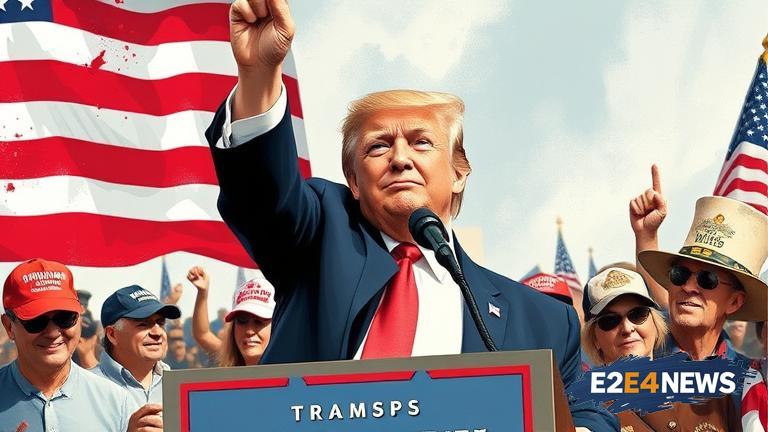The emergence of a new candidate has brought attention to the origins of the MAGA movement, with the candidate suggesting that the Tea Party was instrumental in its development. This assertion has sparked a heated debate among political analysts, with some arguing that the Tea Party’s emphasis on limited government and fiscal conservatism laid the groundwork for the MAGA movement’s populist and nationalist ideology. The Tea Party, which rose to prominence in the late 2000s, was characterized by its opposition to government spending and taxation, as well as its skepticism of mainstream politics. The movement’s focus on grassroots activism and its ability to mobilize large numbers of people around specific issues helped to create a sense of community and shared purpose among its adherents. As the MAGA movement began to take shape, it drew on many of the same themes and ideas that had animated the Tea Party, including a distrust of elites and a desire for greater transparency and accountability in government. However, the MAGA movement also introduced new elements, such as a strong emphasis on nationalism and a willingness to challenge traditional norms and institutions. Despite these differences, the new candidate argues that the Tea Party’s influence can be seen in the MAGA movement’s emphasis on outsider politics and its rejection of mainstream ideologies. The candidate also suggests that the Tea Party’s use of social media and other digital platforms helped to pave the way for the MAGA movement’s online activism and organizing. While some analysts have expressed skepticism about the candidate’s claims, others have noted that the Tea Party’s legacy can be seen in the MAGA movement’s focus on issues like immigration and trade. The Tea Party’s opposition to the Affordable Care Act, for example, helped to galvanize opposition to the law and create a sense of urgency around the need for healthcare reform. Similarly, the MAGA movement’s emphasis on border security and immigration control reflects the Tea Party’s earlier focus on these issues. The new candidate’s comments have also sparked a discussion about the role of ideology in shaping political movements, with some arguing that the Tea Party’s emphasis on limited government and individual freedom helped to create a sense of ideological coherence and purpose among its adherents. Others have noted that the MAGA movement’s ideology is more complex and multifaceted, reflecting a range of influences and ideas. As the debate over the Tea Party’s influence on the MAGA movement continues, it is clear that the new candidate’s comments have touched a nerve and sparked a important conversation about the origins and evolution of these political movements. The candidate’s assertion has also raised questions about the relationship between political movements and the broader cultural and social context in which they emerge. The Tea Party, for example, was shaped by the economic and political conditions of the late 2000s, including the financial crisis and the election of Barack Obama as president. Similarly, the MAGA movement has been influenced by a range of factors, including the rise of social media and the growing sense of disillusionment and discontent among many Americans. As analysts continue to debate the merits of the new candidate’s claims, it is clear that the relationship between the Tea Party and the MAGA movement is complex and multifaceted, reflecting a range of historical, cultural, and ideological factors. The new candidate’s comments have also sparked a discussion about the role of leadership and personality in shaping political movements, with some arguing that the Tea Party’s success was due in part to the charisma and organizational skills of its leaders. Others have noted that the MAGA movement’s success has been driven by the personality and ideology of its leader, Donald Trump. As the debate over the Tea Party’s influence on the MAGA movement continues, it is clear that the new candidate’s comments have raised important questions about the nature of political movements and the factors that shape their development and evolution. The candidate’s assertion has also highlighted the need for a more nuanced and detailed understanding of the historical and cultural context in which these movements emerge. By examining the complex and multifaceted relationship between the Tea Party and the MAGA movement, analysts can gain a deeper understanding of the factors that shape political movements and the ways in which they reflect and influence broader cultural and social trends.
